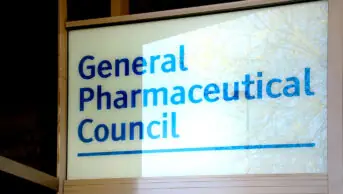
JL / The Pharmaceutical Journal
“This is the biggest change in pharmacy education and training since the profession moved in the mid-20th century from the apprenticeship route to become a degree-only profession,” says Marc Donovan, chief pharmacist at Boots.
But the proposals from the General Pharmaceutical Council (GPhC) — the pharmacy regulator for the education and training of pharmacy students in Great Britain — to integrate standards for the MPharm and preregistration year have been met with a wary response from trainers, pharmacy schools and students.
Currently, pharmacy students study for an MPharm degree for four years; this is followed by a year of preregistration training before graduates enter the profession. If the changes proposed by the GPhC go ahead, the preregistration year will be replaced by 52 weeks of work placements — known as “learning in practice” — embedded within the undergraduate programme.
The idea is that students are exposed to patients in a range of environments from early on in their training, equipping them to work across a range of sectors and settings — something that is increasingly being demanded of the profession. The most likely outcome is an integrated five-year pharmacy degree, but other models of implementation are possible.
The interview process for the new degree will become more interactive (see Box 1); curricula will ensure that students will be better prepared to become independent prescribers; and university staff will have to be trained in equality and diversity principles under the proposals to update the education of pharmacists.
Box 1: New-style interviews planned
The main elements of the education and training proposals from the General Pharmaceutical Society (GPhC) are greater focus on clinical skills, a stronger emphasis on interprofessional learning, and more time spent developing students’ communication and interpersonal skills.
How might the increased emphasis on communication and interpersonal skills play out? The GPhC would like to see the recruitment process feature interactive components, possibly in the form of multiple mini interviews (MMIs) and group work.
“At the moment there is a degree of variability — particularly starting with the admissions process — into different schools of pharmacy,” says Andrew Morris, head of pharmacy at Swansea University Medical School, who is developing a new MPharm that is due to begin in 2020.
“There’s a huge amount of variability in different interviewers, so by having a series of shorter, almost OSCE [observed structural clinical examination]-style interviews — some might be face-to-face, some in groups — you get a better picture of the applicant as a whole rather than just looking at their A-level results.”
As students progress through the course, communication and listening skills could also be assessed in OSCE-style settings, Morris says. “We would want to see a wide variety of assessment mechanisms because there are a lot of different skills and competencies that we’ll need to evaluate. You can’t just do that with exam results and lab scores.”
It is also not yet known how the placement recruitment process — currently managed through Oriel, in the main — would work under the new proposals. Gail Fleming, director for education and professional development at the Royal Pharmaceutical Society, was part of the Modernising Pharmacy Careers programme board. “Our favoured model was a national coordination of placements,” says Fleming.
“It’s more efficient that way. It’s also easier to support learning in practice supervisors, and assess placements.
“Employers want students not just from their own doorstep but from across country: it adds diversity. If everyone recruits locally, universities may have varying training programme needs and different requirements for learning in practice supervisors.”

Source: Andrew Morris
Andrew Morris, head of pharmacy at Swansea University Medical School, is developing a new MPharm that is due to begin in 2020
The GPhC says the pace of change in pharmacy has increased in recent years, with greater use of technology and an increase in the range of services provided. There is also a wider expectation that pharmacists can help relieve some of the pressures on the wider NHS, with pharmacists’ roles as frontline healthcare professionals continuing to develop, particularly in GP practices and care homes. Pharmacists are increasingly being asked to operate in multi-professional teams across healthcare settings, and all of these factors require a refresh in the way that pharmacists are trained, the regulator says.
The GPhC proposals are large in ambition, but do not give much detail on how they will be achieved.
Overhauling pharmacy training
Donovan explains that implementing the proposals would require “major changes” to how pharmacy education and training is structured. “It has large implications for universities, who become responsible for students operating out of day-to-day oversight, and training providers, who currently see providing preregistration training as a pipeline for new employees, and subsidise it accordingly,” he says.

Source: Marc Donovan
Marc Donovan, chief pharmacist at Boots, says that implementing the proposals would require “major changes” to how pharmacy education and training is structured
Boots is the largest training provider for UK preregistration pharmacists outside of the NHS, but Donovan adds that the GPhC proposals provide “little clarity on how this would be funded”. He adds: “Clear statements of support by funding authorities and governments are needed. Without funding there is a real risk that these proposals will fail, leading to shortages of suitably-trained pharmacists in the medium term.”
The Pharmacy Schools Council has raised concerns on behalf of universities about the practicality of the proposals. Nigel Ratcliffe, chair of the Pharmacy Schools Council, says the plans involve “a massive amount of financial change”, with universities potentially expected to make a contribution to learning in practice placements, and students losing a preregistration salary on top of paying fees for another year.
“There doesn’t seem to be a risk-benefit assessment,” says Ratcliffe. “It’s a radical approach before we’ve actually looked at whether there are more constructive — maybe quite challenging — changes that can be made more easily and that are financially sustainable.”
He adds that there is a risk that by integrating the preregistration year, students are “turned into observers rather than doers” and that universities are already doing a “massive amount” of experiential learning these days.
“Many students, within the first two months of their first year, are having a patient-facing interaction,” he says. “And there’s more interprofessional experience. You could say, is that not enough change?”
The British Pharmaceutical Students’ Association (BPSA) says students “lauded” the proposal to have an integrated degree but “were not convinced that it could be enforced in a way that did not negatively affect students”.
Opposing the proposals
The BPSA’s draft response to the GPhC’s consultation, seen by The Pharmaceutical Journal, says “most” of the students who responded to its request for views on the GPhC plans “disagreed with the notion of setting integrated standards for the five years of education”.
It adds: “It was widely believed that the proposals were not written with the interest of students’ development in mind but rather a result of financial constraints.”
The main problem seems to be the timing of the learning in practice training. The BPSA says that placements earlier in the degree (i.e. in the first and second years) would “not be beneficial in a practical sense owing to the inability to utilise knowledge (as they would not have acquired a wealth of knowledge)”.
Ratcliffe suggests an alternative option: “You put a little bit more experiential learning in the first four years, and ask for a little bit more work experience during holidays. And then they still do their fifth year of one continual period of supervised clinical practice.”
This idea would be possible under the GPhC proposals as they suggest that it is up to universities and employers to decide when the 52 weeks of learning in practice should be carried out. It could be in one single block or several shorter blocks – but the proposals say that at least “26 weeks … must be patient-facing and must take place towards the end” of the degree.
The Company Chemists’ Association (CCA) has been working with the Association of Independent Multiple Pharmacies and the National Pharmacy Association to consider how a more integrated education and training plan may work in practice.
Kate Livesey, policy and programmes manager at the CCA, says her preference would be for two three-month placements in the second and third years and a six-month placement in the fourth year during a five-year MPharm. However, during discussions at a workshop between the CCA and other organisations there was no agreement on what they believed would work.

Source: Kate Livesey
Kate Livesey, policy and programmes manager at the Company Chemists’ Association, says there is a lot of uncertainty about how a more integrated education and training plan may work
“As a sector, we’ve still got a lot of work to go to see what model would be deliverable,” said Livesey. “The most striking thing I took away from the workshop was that everybody’s ideal model was different. It shows how much uncertainty there is: there’s not loads of evidence to say it should be two six-month placements. We want to continue having discussions with everyone to think through the practicalities.”
Optimism for the proposals
Roisin O’Hare, vice president of the Guild of Healthcare Pharmacists, which represents pharmacists working at hospital trusts, is more positive about the “really ambitious” GPhC proposals. “What they’re trying to do is future-proof the profession. It’s probably the right step, to start to think about how we contextualise students’ learning,” she says.
“At the moment, the first four years are pretty university based. Students need more time and experience to contextualise that knowledge and develop competence in the clinical skills they need.”
O’Hare says trusts would welcome hosting students “earlier and more often”, particularly as students could then “graduate and then register contemporaneously”.
“There’s less of a jolt between ending your degree and entering practice,” she adds.
But she warns that altering the timing of learning in practice will change the way the workplace training is provided, with practice educators likely to require additional assessment skills if students are to graduate as a fully-qualified pharmacist at the end of a five-year MPharm: “They’re all going to have to be trained to become assessors at the level that the university will require. That’s going to be a shift in practice for all pharmacists. We haven’t had to do that before, whereas our colleagues in medicine have.”
The Royal Pharmaceutical Society, in its response to the consultation, said that “closer integration of academic study and learning in practice is important and should ultimately deliver pharmacists who are high quality, safe, accessible, acceptable to the public and in the right place”. But it added that the roles and responsibilities of the various stakeholders in developing such an integrated curriculum needed “tighter definition”. The Society also warned of “risks to the future supply of the pharmacy workforce if these proposals are implemented prior to funding being identified and secured … the importance of funding cannot be overstated”.
Ongoing discussions
Similar five-year pharmacy programmes have been discussed for many years — they were originally mooted in 2011, as part of the Modernising Pharmacy Careers policy programme launched by the then Department of Health.
A small number of universities offer the option of a five-year integrated MPharm, aimed primarily at international students, so they can complete their preregistration training while living in the UK on a student visa. And the devolved nations are probably more advanced in their thinking than England on making this a universal option.
The Welsh government is currently considering the idea of a five-year integrated degree, as part of the Modernising Pharmacy Careers in Wales programme, and the Scottish government had, prior to the GPhC consultation, already started planning for a five-year, integrated MPharm.
Margaret Allen, pharmacy dean at Healthcare Education and Improvement Wales, says she welcomes the proposals: “We are currently reviewing the model of training placements for the preregistration year in partnership with higher education institutions, training placement providers and students. This review will provide the foundations to fulfil our long-term vision to modernise pharmacy careers in Wales and ensure pharmacists can provide more for patients at an earlier stage in their career.”
NHS Education for Scotland (NES) has already introduced almost £3m of Additional Cost of Teaching (ACT) funding for pharmacy to support the expansion of what it calls ‘experiential learning’ for all undergraduate MPharm students at the two schools of pharmacy in Scotland.
“We believe that the introduction of the ACT monies, providing increased and enhanced experiential learning, together with the five-year proposals in Scotland, comply with the GPhC’s proposals for the new initial education and training standards,” a spokesperson for NES’s pharmacy team says.
The team in Scotland is also looking at additional admissions requirements, such as interpersonal and communication skills, as it develops the five-year MPharm.
The GPhC says it is analysing submissions to the consultation and it will present a report to its council that will “contain more information about the issues raised by our respondents”.
A spokesperson says: “We would emphasise again that we think there will be different ways and models both within and across the countries of Great Britain to deliver the standards and we will ensure that our approval methodology is flexible enough to accommodate diverse and innovative provision of pharmacy education and training.”
Box 2: Should pharmacists be called ‘doctor’?
It remains to be seen what form the final outcome of the education and training proposals will take — and if these changes will address the current failure rates in the preregistration exam — something that the General Pharmaceutical Council, in its proposals, says it is concerned about.
There are also concerns about the falling number of applications to study pharmacy, and an increase among pharmacy schools to fill places via the clearing system.
If and when a five-year integrated MPharm becomes reality, the Guild of Healthcare Pharmacists says it will directly compete for recruitment with medicine and dental five-year degrees. And Roisin O’Hare, vice president of the Guild of Healthcare Pharmacists, has a novel idea on how to attract students.
“Both of these degrees, as well as veterinary medicine, offer their graduates a ‘Dr’ title. Pharmacy graduates in Canada and America also gain a ‘Dr’ title,” she says.
“We think this should be considered as part of the changes to the pharmacy degree in the UK, given the significant evolution in patient care responsibilities for pharmacists, including prescribing rights, across all sectors of practice. This may also serve as a recruitment tool for pharmacy courses.”


